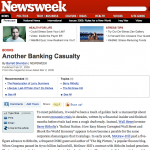Newsweek covers the McGraw Hill issue; I should have an announcement on the book later this week.
Here’s what the print edition of Newsweek has to say
To most publishers, it would’ve been a touch of golden luck: a manuscript about the worst economic crisis in decades, written by a financial insider and finished months before rivals had even a rough draft ready. Instead, Wall Street investor Barry Ritholtz’s “Bailout Nation: How Easy Money Corrupted Wall Street and Shook the World Economy” appears to have become a parable for the same corporate shenanigans that it catalogs. In early 2008, McGraw-Hill paid a five-figure advance to Ritholtz, a frequent CNBC guest and author of “The Big Picture,” a popular finance blog. When Congress passed its $700 billion bailout bill, McGraw-Hill’s contract with Ritholtz looked prescient. The imprint started taking pre-orders and set a March release date. Then, in early February, it dropped the book.
Ritholtz claims that he and McGraw-Hill butted heads over scathing passages about bond-rating agencies, which accepted large fees from investment banks while giving sterling ratings to subprime mortgages, helping the banks sell them at premium prices. In his original draft, Ritholtz dubbed this “payola” and called the rating agencies “pimps.” His wrath extended to Standard & Poor’s, a rating agency owned by the same company as McGraw-Hill. According to the author, when his editors took issue with his tone, he agreed to water it down but insisted on criticizing the agencies. Soon after, the book was dropped.
That’s when the blogosphere exploded with claims of undue influence on the part of S&P. But Mary Skafidas, a McGraw-Hill spokesperson, says the company dropped the book because it couldn’t corroborate “a number of assertions covering a wide range of public figures and public entities.” That explanation “raises some red flags,” says Ron Hogan, senior editor at Galleycat, a blog that covers the publishing industry, because most publishers “don’t have super-rigorous fact-checking departments.” Ritholtz says that he turned over nearly 90 pages of additional sources, and that the notion that his facts couldn’t be verified is “ridiculous.”
The idea of corporate entanglements causing the book’s demise is rich with irony—after all, S&P is already accused of being too cozy with the banks whose bonds it rates. But Ritholtz isn’t too upset: he says rivals are offering better advances than the one he’s returning to McGraw-Hill. (emphasis added)
Its essentially accurate, though I can take issue with some small nuances.
>
Source:
Another Banking Casualty
Barrett Sheridan
NEWSWEEK, Mar 2, 2009
http://www.newsweek.com/id/185848



What's been said:
Discussions found on the web: